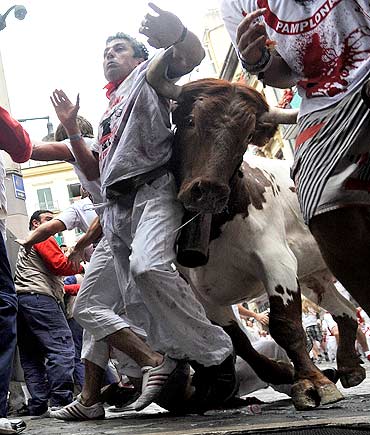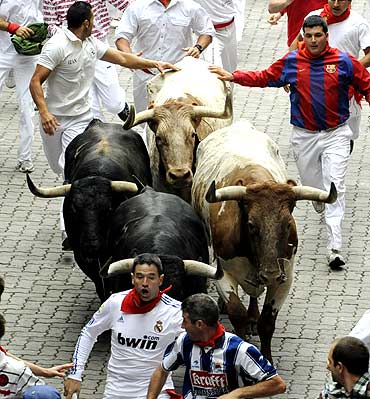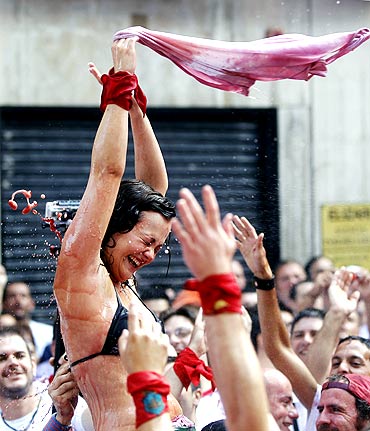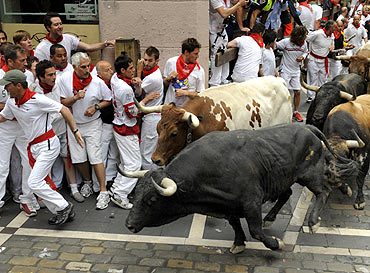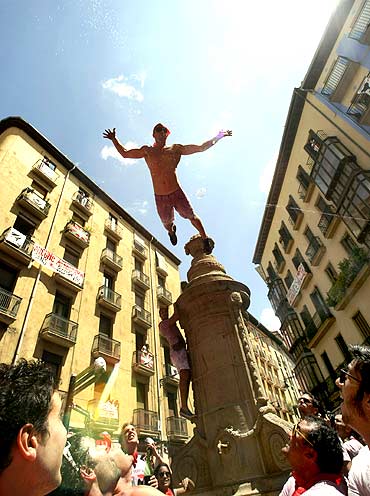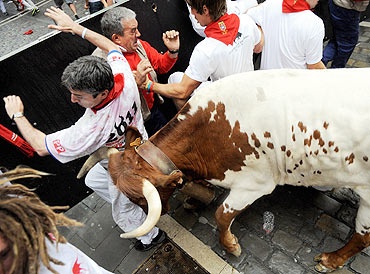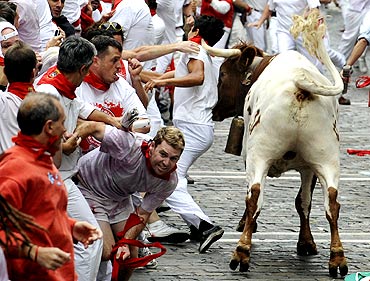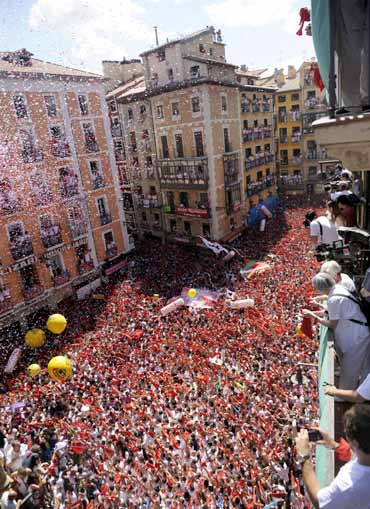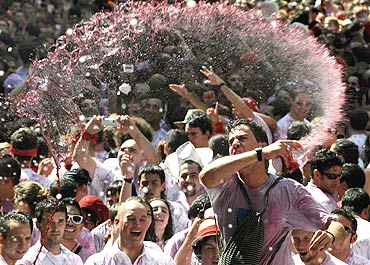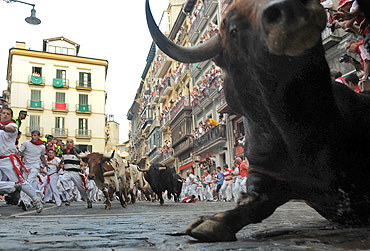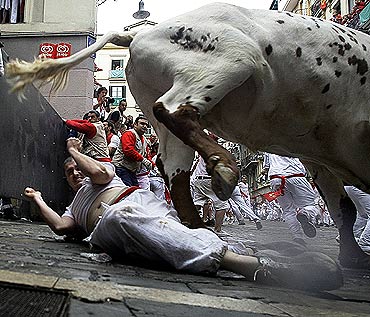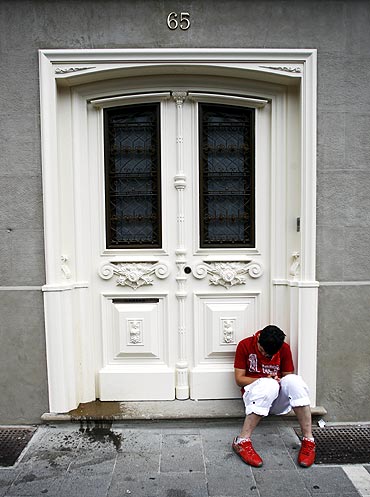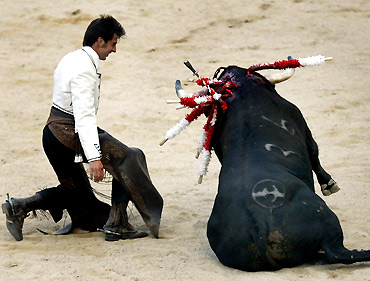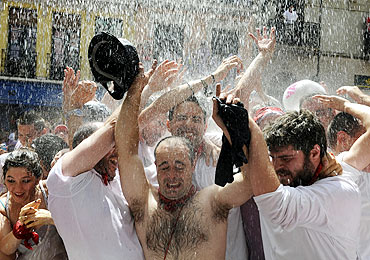This article was first published 14 years ago
Home »
News » In PHOTOS: Smashing party with Spanish bulls
In PHOTOS: Smashing party with Spanish bulls
Last updated on: July 11, 2011 07:59 IST
Image: A man tries to avoid a steer that broke away from the pact of fighting bulls
Photographs: Denis Doyle/Getty Images
The festival of San Fermin, or the Pamplona bull running as it is more commonly known outside Spain officially begins at midday on July 6 every year with the 'chupinazo', which takes place on the balcony of the Casa Consistorial in Pamplona.
Thousands of people congregate in the square awaiting the mayor's official announcement that the fiestas have begun, a rocket is launched and the partying begins.
Click on NEXT to see more PHOTOS...
Image: Runners sprint in front of Torrestrella fighting bulls
Photographs: Vincent West/Reuters
The history of the bullrunning in Pamplona is not clear.
There is evidence of the festival from as far back as the 13th century when it seems the events took place in October as this coincided with the festival of San Fermin on October 10.
Image: A reveller gets sprayed with wine during the start of the San Fermin Festival
Photographs: Susana Vera/Reuters
It seems that the modern day celebration has evolved from this as well as individual commercial and bullfighting fiestas which can be traced back to the 14th century.
Image: A runner leads Torrestrella bulls and steers
Photographs: Eloy Alonso/Reuters
Over many years the mainly religious festival of San Fermin was diluted by music, dancing, bullfights and markets such that the Pamplona Council proposed that the whole event be moved to July 7 when the weather is far more conducive to such a celebration.
Image: A reveller jumps from a fountain at the Plaza de Navarreria
Photographs: Joseba Etxaburu/Reuters
To this day San Fermin remains a fixed date every year with the first bullrun at 8 am on July 7 and the last at the same time on July 14.
The joining together of the religious, commercial and bullfighting festivals and the move to July 7 led to the first official celebration of San Fermines in 1591.
Image: A man tries to avoid a steer that broke away from the pact of fighting bulls
Photographs: Denis Doyle/Getty Images
This inaugural fiesta was a low key affair in comparison to the modern day running of the bulls as it only lasted two days although there was much merriment involving music, a procession and a bullfight.
Image: A steer pushes a reveller with his horn during the first bull run
Photographs: Eloy Alonso/Reuters
Dancing and fireworks became features of the festival over the next few years and the event was extended to July 10.
The Pamplona bull run takes place at 8 am every morning from July 7 to 14. Runners must be in the running area by 7.30 am.
Image: Revellers hold up red scarves during the start of the San Fermin Festival
Photographs: Vincent West/Reuters
The actual run stretches from the corral at Santo Domingo where the bulls are kept, to the bullring where they will fight that same afternoon.
The length of the run is 825 metres and the average time of the run from start to finish is about three minutes.
Image: Revellers are sprayed with wine during the start of the San Fermin Festival
Photographs: Eloy Alonso/Reuters
The streets through the old town, which make up the bull run are walled off so the bulls can't escape.
Each day six fighting bulls run the route as well as two herds of bullocks.
Image: A fighting bull falls during the second day of the running of the bulls
Photographs: Denis Doyle/Getty Images
The tension builds as the release of the bulls approaches and at 8 am sharp a rocket is fired to confirm that the gate has been opened at the Santo Domingo corral.
Runners dressed in white with a red hankerchief around their necks pray to San Fermin then a second rocket announces that the bulls have left. The bulls and the runners then proceed along the route.
Image: A reveller falls next to a steer during the first bull run
Photographs: Eloy Alonso/Reuters
The most dangerous part of the bullrun approaches as there's a closed curve leading into Estafeta, which is the longest stretch of the run.
Next comes a small section of Duque de Ahumada, which is known as the Telefonica stretch.
Image: A reveller sleeps on the street after the first bull run
Photographs: Susana Vera/Reuters
The last stretch is also very risky as the route leads into a dead end street providing access to the Bull Ring.
A third rocket is set off once all the bulls have entered the bullring and the fourth, and final, rocket means that the bulls are now in the bullpen and the bullrun has finished.
Image: Rejoneador (bullfighter on horseback) Roberto Armendariz performs at the San Fermin Festival
Photographs: Joseba Etxaburu/Reuters
The vast number of people taking part in the bullrun nowadays adds to the already considerable danger of running alongside wild bulls weighing in the region of 700kg each.
Too many drunks taking part also increase the risks for everybody.
Image: Revellers are showered with water during the start of the San Fermin Festival
Photographs: Eloy Alonso/Reuters
There are plenty security guards and first aid personnel but there is little they can do during the running of the bulls such that 15 people have died and over 200 been seriously injured since 1924.
A great alternative is to get yourself onto a balcony overlooking the bullrun. You might be lucky enough to meet someone who invites you onto their terrace
